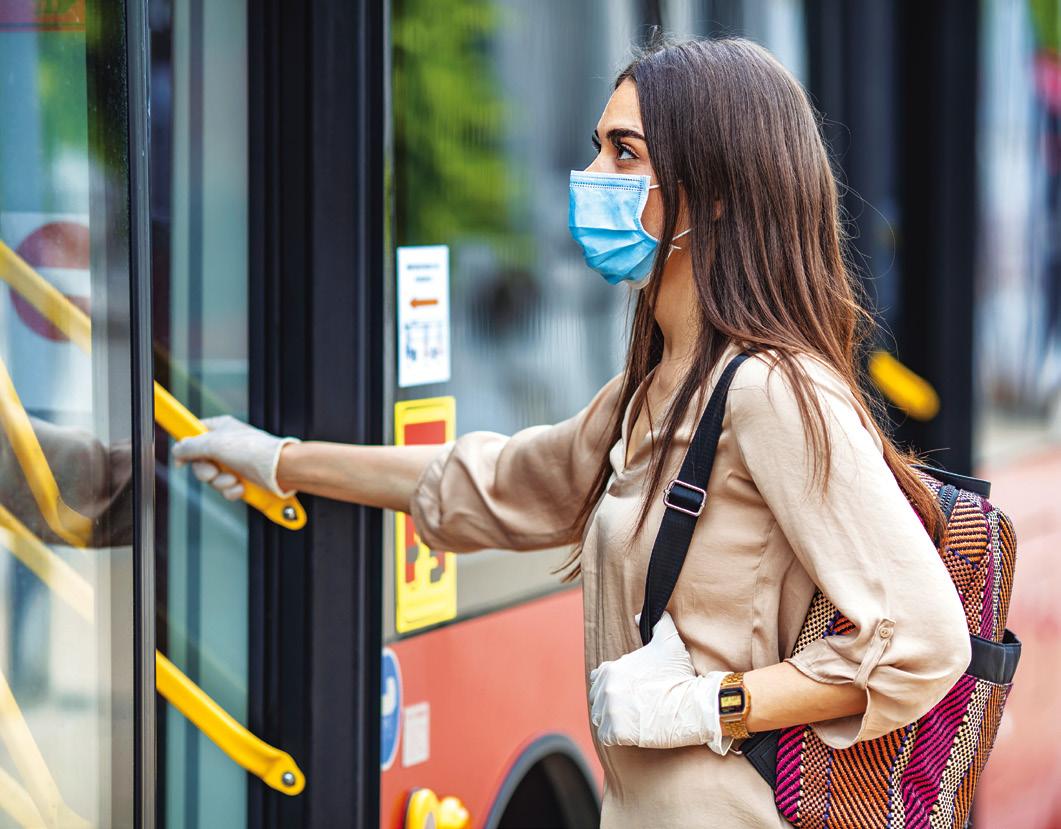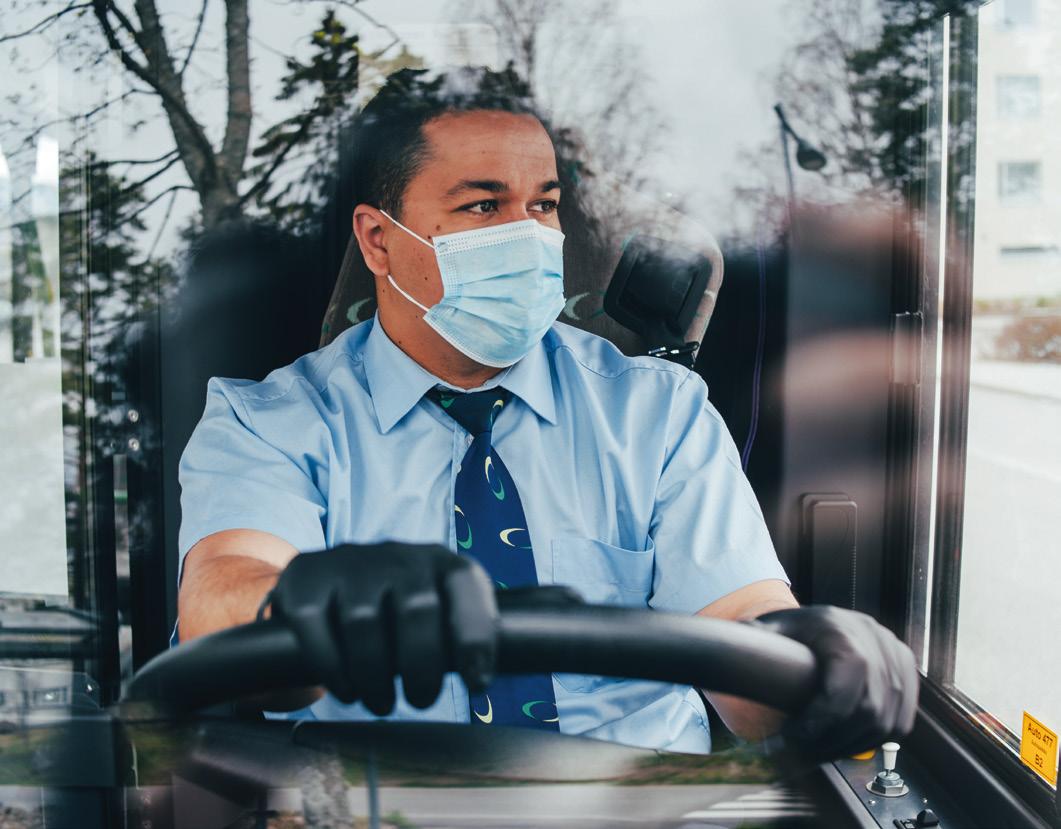
13 minute read
NO TIME TO STOP
TYRES
Singapore-Based Giti Tire says that it has brought together its global research and development to launch a series of new components under the AdvanZtech umbrella. Giti Tire operates R&D centers in China, Indonesia, Germany, and the US, as well as a UK Tire Testing Center.
Representing close to 1,000 team members, Giti said uniting them under the AdvanZtech initiative is enabling it to utilise state of the art equipment and high technologies to create “an allencompassing platform that considers driver needs from six key perspectives”.
Leading the way is Giti Tire’s pattern noise simulation system which optimises the design of its tyres to quiet down the noise from the tyre and road interaction. This technology eliminates annoying tire vibrations by combining testing, modal and transmissibility analysis, and structural analysis, improving overall ride comfort.
Through simulation and test technology, Giti also optimises its tyre structure - fine-tuning tire stiffness, improving grip, and optimising handling response. The company’s low rolling resistance compound reduces friction between rubber molecules, which lowers energy consumption. Computational contour deformation analyses and rolling resistance prediction technologies result in structural designs with optimised deformations. This means less heat generation, less fuel, and better protection for the environment.
Giti is actively engaged in next generation innovative tyre technologies. It says its latest smart tyre technologies help reveal hidden safety hazards opening new frontiers for improved safety and performance. GITI UNVEILS ADVANZTECH INITIATIVE
MCB ‘FINALLY’ READY TO BOUNCE BACK
PARTS
Mineral Circles Bearings (MCB) says its return to Automechanika Dubai this October is an opportunity to showcase its new partnership with industry-leading brand SKF and SNR. The company said in a statement that it is “finally ready to bounce back from its two-year-long hiatus from the event” after last participating at the aftermarket show in 2018.
It will use Automechanika Dubai to introduce SKF’s wheel bearing, timing, and accessory belt kits to the market: “which is very timely for the burgeoning automotive market in the region. With SKF and Mineral Circles’ newly inked agreement, both pacesetters are set to expand their footprint specifically for the Automotive market.”
As the sole authorised distributor in the UAE, Mineral Circles Bearings described
TIMELY LAUNCH
MCB said Automechanika is the perfect platform to launch its new brands.
Automechanika Dubai as the best opportunity to underline its convenience and benefits, specifically for its top European vehicle brands. Both premium brands manufacture high caliber kits are fit for leading car brands such as Nissan, Volvo, Renault, Honda, among others.
Managing director Hassanein Alwan said he believes there is a

bigger potential to penetrate a wider market audience through the collaboration with SNR and SKF.
“These two brands are globally known to cover at least 98% of European vehicle-inoperations,” he explained. “This will put an end to the difficulty of the MEA region to have easy access to European brands.”
IAA AND AUTOMECHANIKA FRANKFURT BOTH OFF
EVENTS
The world’s leading event for transport, logistics and mobility has been cancelled and will not return until 2022.
The IAA Commercial Vehicles show was dues to take place during its usual slot of September but organisers said the health risks of the Covid-19 pandemic and the measures taken to contain it have “fundamentally changed the backdrop” for the event.
“The Covid-19 pandemic is having an unprecedented impact on business in the sector and also the IAA,” said the IAA’s organisers, the German Association of the Automotive Industry (VDA) in a statement.
“Many countries have travel restrictions that will remain in force for several months to come. Large

RESPONDING TO DEMAND
The organisers of Automechanika said that both safety concerns and demand from customers led to its postponement.
events have been prohibited over the coming months in nearly all European countries. Given the situation with the corona pandemic, face-to-face meetings can no longer be held at a trade fair and particularly at the IAA.”
Automechanika Frankfurt has also been postponed until 14 to 18 September 2021. Show organisers Messe Frankfurt said in its own statement that it “simply would not have been possible” for many of the exhibitors and visitors from over 180 countries to take part in the event under the conditions currently prevailing or those expected at that time.
The event is expected to resume its biennial rotation.
“With waves of the pandemic moving around the globe and many countries not expecting it to peak until the summer, I am certain that the decision to postpone is the right one,” said Detlef Braun, member of the Executive Board of Messe Frankfurt.
Atkins Acuity looks at how we can keep the world moving during and after COVID-19
FINDING A NEW NORMAL TRANSPORT FOCUS:

The World Health Organisation (WHO) declared COVID-19 an international health emergency on 30th January 2020 and a global pandemic on 11th March 2020. Compared to previous global pandemics such as SARS or Ebola, the current COVID-19 Crisis is a global event without precedent, possibly in a generation, and exerts a number of specific impacts over and above conventional disaster management and recovery.
The crisis is as much an economic crash as it is a public health emergency, now exceeding the 2008 Financial Crisis. In the Gulf Consultative (GCC) Council region, major lockdowns on personal and business activity have been compounded by record lows in oil price, on which economic activity and Government budgets are based.
Right now, as we potentially approach a pause in what the International Monetary Fund has called the “Great Lockdown,” the
This is a perfect storm of circumstances”
Crisis presents immediate logistical and operational challenges requiring urgent mitigation, with containing the number of COVID-19 cases and deaths being the top priority ahead of economic recovery. According to The National Cooperative Highway Research Program (NCHRP), 80% of these responses are common to all crisis categories, but 20% are unique to pandemic and local circumstances.
Although less severe than being seen in Europe or the USA, the human cost of the
Pandemic in the GCC is real and tangible. Over time, the balance and trade-offs between policy objectives is likely to change with the current hard lockdowns giving way to a careful restarting of economic and social activity. This has is already commencing is some parts of the GCC and is expected to continue into June and July, ahead of a restarting of international and regional movement across borders later in the year.
The transport sector, and the public and private organisations within it, is impacted by COVID-19 as much as others. However, it has a vital role in keeping essential goods and workers moving; it will have a vital role in the recovery too, especially if Governments prioritise infrastructure investment as an economic stimulus and a means of re-invigorating the private sector.
As well as challenges, the Crisis presents some positive opportunities. We should not lose sight of what could be done better or differently and how our postCOVID-19 World might benefit as a result.
When people, business and communities recover from COVID-19, we are unlikely to go back to normal – there will be medium- and long-term implications and, whilst there are pressing immediate needs, we should start thinking about those now. There is also a need to be better prepared for future pandemics.
Globally, COVID-19 has taken a massive toll in terms of confirmed cases and reported deaths. The picture in the GCC has been comparatively modest compared to Europe, the USA & China, but cases have accelerated dramatically since March, rising to a peak of infections across the region.
Lockdowns have been imposed in all countries (e.g. National Sanitation Program in UAE, 24-hour curfews in Saudi Arabia), with strong restrictions on personal or work travel except for essential purposes.
There has been a near cessation of international flights, with the travel and tourism sector now shutdown. Economic impacts have been exacerbated by record low oil prices. Despite OPEC production cuts being agreed, prices have been trading at below half the level in January and continue to be volatile.
Central banks, together with immigration authorities, have introduced various economic stimulus packages, support and relief for people and business, but these will take time to kick in and the IMF’ s World Economic Outlook has already forecast sharp declines in growth for 2020, both globally and for the GCC.
This is a perfect storm of circumstances. Recovery from the health and economic emergency may commence in the second half of 2020. This is dependent on many factors which remain uncertain, not least the chance of further waves of infection. The effects of COVID-19 will be felt well into 2021, possibly beyond.
There been sharp and substantial falls in demand for movement as a result of stay
home campaigns, curfews, cessation of tourism, business contraction and exodus of expat workers in all countries of the GCC. International and domestic aviation is nearly completely suspended with most national airlines grounded and airports at a standstill, except for air cargo and a small number of repatriation flights. General traffic is estimated to have fallen by around four-fifths dependent on area, whilst international benchmarking suggests road freight may have halved. Public transport

CREATING POLICIES THAT PROTECT PASSENGERS
Governments are going to need to assess the overall demand for travel, and how and in what form it will recover, together with associated issues such as transport revenues, congestion and clean air. They should also safeguard the continued viability of mass transit as the preferred mobility solution for large cities.
The way people work is chaning. Office and home working practices, have implications for commuting and business travel, as well as work-life balance, lifestyle choices, how organisations are run and change management.
Supply chain management, with freight and logistics should be given priority over movement of people.
Technology and automation, with COVID-19 accelerating the agenda for digital transformation, smart mobility management, autonomous vehicles, drones and the next generation of Intelligent Transport Systems. Emergency planning, business continuity, resilience and risk management will receive greater focus, but be done and certified properly, replacing frameworks which have proved ineffective in the current crisis.
has been suspended in many locations, and, where services are still running, seeing falls in patronage in line with road traffic. For the latter: there are limitations on occupancy to provide social distancing; frontline staff are being provided with masks, gloves and sanitisers against infection; and there has been a stepping-up in cleaning and sanitation of public areas and facilities.
New regulations (and penalties) have been introduced to minimise trip-making and enforce social distancing. At the same time, some regulations have been eased, such as free public parking, suspension of road tolls and support for home deliveries and enabling movement of health supplies.
While there has been slowdown in construction and maintenance projects (e.g. Dubai’s Route 2020, Riyadh Metro) not all impacts are negative. Air quality has improved, congestion & road traffic accidents are likely to have fallen; the question is how such benefits can be retained as demand rises as the lockdowns ease.
Public and private entities across the GCC have closed offices and implemented remote working. For example, they are issuing laptops and implementing ICT to allow employees to communicate. Managers are having to coordinate their teams, set tasks, meet deadlines & achieve performance KPIs virtually.
In transportation, management of frontline staff poses special challenges, in terms of absenteeism, reduced capacity, occupational health and safety and protecting key workers from contracting or passing on disease. Non-essential tasks are being wound down or continuing only with new safeguarding procedures in place.
The role and mandate of transport agencies has been strengthened, operationally being regarded as an essential service alongside health agencies, police, civil defense and supply chain management. This raises a need for enhanced organisational leadership and joint working to common goals across agencies.
Since February, we have been monitoring the impacts of COVID-19 across the GCC, as well as globally.
We are gathering evidence through our own worldwide offices and via our participation in global road and transport sector groupings. We are collating, and influencing, the practices and procedures which are emerging, examining what the key issues are, what seems to work at this

A GLOBAL PROBLEM FOR TRANSPORT
From our sources, ten issues have emerged as the most pressing for transport organisations around the World and are listed below. We continue to expand and update this list continually whilst the Crisis continues, looking at immediate pressures as well as the longer-term challenges and opportunities: 1. Tracking changes in demand for transport now and into the recovery period, together with associated implications (e.g. falls in toll revenues or public transport fares, road traffic accidents); 2. Required changes to the role, mandate and powers of transport agencies in delivering essential services, sometimes under “emergency powers” and relationships and working arrangements with other agencies (such as the police, civil defense and health agencies); 3. Keeping key road networks and facilities open, accessible and operational, and regulating and maintaining the movement of essential goods (such as food and health supplies) and workers;
4. Ensuring the health & safety of road and transport workers, especially those in operational roles; 5. Connecting, managing & maintaining effectiveness of officebased staff working from home; 6. Continuing, postponing, or bringing forward infrastructure construction and maintenance activities; 7. Personal mobility management and contact tracing (including use of smart/Bluetooth applications); 8. Relations of public agencies with the private sector supply chain, including contract management and variation, maintaining project schedules and outputs, and continued support for SMEs; 9. Cybersecurity, including an increase in hacking and other threats, with new remote working arrangements especially vulnerable until protections are put in place; 10. Financial sustainability, at a time when assets need to be maintained and some operational costs have risen, but revenues have all but dried up.
time and what remains problematic. The situation is fast-moving; it is still messy, but some clear lessons are already emerging.
Across the World, since the COVID-19 crisis took hold at the end of January 2020, public transport systems have seen sharp falls in patronage. In some cases, services have been suspended entirely or had the level of service sharply reduced. Elsewhere, services have continued to run, but with the general public locked down or subject to strong travel advisories, ridership have become focused on essential workers and those carrying out unavoidable personal business.
Data is still being complied, but in London, buses and trains are carrying only around 20 - 30% of normal demand. Equivalent reductions have been seen in New York, Paris, Singapore and other global cities, whilst in Dubai , the first metro in the GCC was suspended for a period as the National Sanitisation Programme was extended to 24 hours a day, with residents only allowed to leave their homes with an online Move Permit issued by the Police. Ridership has become more focused on key workers, such as healthcare professionals and auxiliaries, essential operational staff and those working in supply chain activities.
Where still running, public transport faces a number of operational challenges: • Frontlinestaff(themselves reduced by increased sickness and absenteeism) must be equipped with appropriate personal protection, such as masks and gloves, and in some cases protected by screens; • Surfacesinstationsandvehiclesmustbe regularly sanitised, with many systems subject to a comprehensive deep-clean; • Theneedtomaintainsocialdistancing, requires passenger access to vehicles to be regulated, numbers to be maintained well below normal peak capacities and front doors, seats or standing areas to be closed off; and appropriate signage and passenger guidelines to be installed. • Cashpaymentpresentsahighrisk of transmission of infection, driving a shift towards electronic or cashless payment with minimal interaction between employees and passengers.
It seems likely that at least some of these measures will be retained as the current period of general lockdowns comes to an end and public movement is slowly reactivated with precautions in place to avoid a resurgence of infections.






